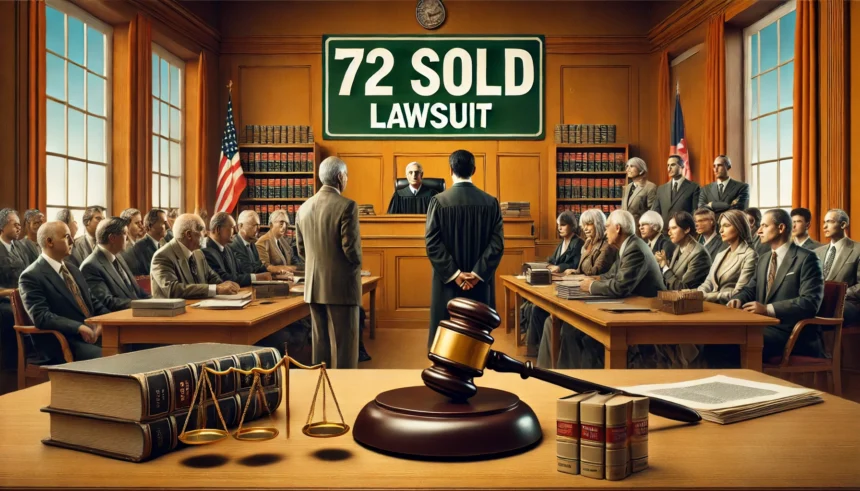Introduction to the 72 Sold Lawsuit
The 72 Sold lawsuit has captured the attention of many in the real estate industry and beyond. As e-commerce continues to shape how we buy and sell properties, this legal battle raises vital questions about consumer rights and business practices. What led to this dramatic showdown? What are its implications for buyers, sellers, and companies alike? In this article, we’ll dive into the details surrounding the 72 Sold lawsuit—unpacking its background, key issues, and what it means for everyone involved. If you’ve been following this case or just want to understand more about your rights as a consumer in today’s digital marketplace, keep reading!
Background and History of the Lawsuit
The 72 Sold lawsuit emerged from growing consumer concerns about the company’s practices in real estate transactions. Founded as an innovative approach to selling homes quickly, it gained popularity for its promise of a streamlined process.
However, complaints began surfacing regarding fees and transparency. Homeowners felt misled by advertising that suggested lower costs without clear explanations of commissions involved.
As more consumers shared their experiences, dissatisfaction transformed into legal action. The lawsuit highlighted not just individual grievances but broader issues within the e-commerce landscape.
Legal experts noted that this case could set precedents. It raised questions about accountability and ethical practices in online business models. Such developments have significant ramifications for both consumers and companies navigating similar waters.
Key Issues Raised in the Lawsuit
The 72 Sold lawsuit has brought several critical issues to light. Central to the case is the question of transparency in pricing and fees. Consumers allege that they were misled about total costs associated with selling their homes.
Another significant concern revolves around marketing practices. Plaintiffs argue that some advertising claims are deceptive, leading homeowners to believe they would receive more value than what was ultimately offered.
Additionally, there are questions regarding customer service standards. Many feel neglected or poorly informed during the selling process, which adds frustration and doubt.
Legal implications for consumer rights also come into play. This lawsuit serves as a potential benchmark for how e-commerce businesses must operate in terms of honesty and accountability.
Each issue highlighted reflects broader concerns within today’s real estate market, making it essential for consumers to stay informed about their rights when engaging with such services.
Implications for Businesses and Consumers
The 72 Sold lawsuit has significant implications for both businesses and consumers. For companies, it highlights the necessity of transparent practices. Businesses must ensure they communicate their terms clearly to avoid misunderstandings that can lead to legal challenges.
Consumers may become more cautious when engaging with real estate transactions. They might demand greater transparency regarding fees and processes. This heightened awareness can shift buyer behavior significantly.
Moreover, trust plays a crucial role in e-commerce. A tarnished reputation from such lawsuits could deter potential clients or customers from using these services again.
As legal scrutiny increases, businesses will need to adapt quickly to maintain consumer confidence while complying with regulations that protect buyers’ rights effectively.
This evolving landscape underscores the importance of ethical marketing strategies and consumer education in fostering long-term relationships between businesses and their clientele.
Response from 72 Sold and Other Companies Involved
72 Sold has actively addressed the lawsuit, emphasizing its commitment to transparency and customer satisfaction. Company representatives argue that their business model is designed to streamline real estate transactions while providing significant benefits to sellers.
Other companies involved in the case have echoed this sentiment. They assert that innovation in e-commerce should not be stifled by legal challenges. Many believe these lawsuits could hinder progress within the industry.
In response, some firms are enhancing their consumer protection measures. This includes clearer communication about fees and services offered. The goal is to reassure customers that they are being treated fairly.
Public statements from 72 Sold highlight a focus on resolving issues amicably. They emphasize collaboration over confrontation, aiming for solutions beneficial to all parties involved in this evolving situation.
The Future of Consumer Protection in E-commerce
The landscape of e-commerce is evolving rapidly. As technology advances, so do the challenges in consumer protection. More consumers are shopping online, and this trend brings new risks.
Regulatory frameworks must keep pace with these changes. Governments around the world are recognizing the need for stronger safeguards against fraud and deceptive practices. Enhanced regulations could mean better transparency for buyers.
Beyond legislation, businesses play a critical role. Companies that prioritize ethical marketing will foster trust among consumers. This trust can lead to long-term loyalty and repeat business.
Innovative technologies like blockchain may also enhance security measures in transactions, providing an additional layer of protection for customers’ data and finances.
As we move forward, collaboration between regulators and industry leaders will be vital. A proactive approach to consumer rights can create a safer online marketplace for everyone involved.
Conclusion: Takeaways for Consumers and Businesses
The 72 Sold lawsuit highlights critical issues in consumer protection. It serves as a wake-up call for both buyers and sellers to be vigilant about their rights.
Consumers should always read the fine print. Understanding terms and conditions can prevent unpleasant surprises later on. Transparency is key in any transaction.
For businesses, maintaining ethical practices is essential. A solid reputation builds trust with customers. It’s not just about making sales; it’s about fostering long-term relationships.
Adapting to legal challenges proactively can help companies avoid future pitfalls. Staying informed on regulatory changes and industry standards will benefit everyone involved.
In this evolving landscape, collaboration between consumers and businesses becomes increasingly important. Open communication encourages accountability and clarity across all platforms, ensuring fair treatment for all parties involved.
FAQs
The 72 Sold lawsuit has sparked a significant conversation about consumer rights and business practices. As we navigate this complex issue, it’s essential to address some common questions that arise.
Q: What is the 72 sold lawsuit about?
A: The 72 Sold lawsuit centers on allegations against the company regarding its sales methodology and transparency in pricing. Consumers have raised concerns about potential misleading practices affecting their home-selling experience.
Q: Who is involved in the lawsuit?
A: The primary parties include 72 Sold as well as various consumers who feel aggrieved by their services. Each party presents differing perspectives on the case’s validity and implications.
Q: What are the possible outcomes of this lawsuit?
A: Outcomes could range from settlements to policy changes within 72 Sold or even more extensive industry reforms if widespread issues are identified. The ramifications might extend beyond just one company, influencing how real estate transactions occur online.
Q: How can I protect myself when using e-commerce platforms like 72 Sold?
A: Researching companies thoroughly before engaging with them is key. Look for customer reviews, ask for references, and ensure you understand all fees involved in any transaction to avoid unpleasant surprises.
Q: Will this impact other similar businesses in e-commerce?
A: Yes, depending on the outcome of the lawsuit, it could set precedents impacting how other businesses operate within e-commerce. A ruling favoring consumers may prompt stricter regulations across various industries to enhance transparency and protection.
Staying informed is crucial as developments unfold related to the suit against 72 Sold. Understanding your rights as a consumer can help you make better choices now and into the future.




